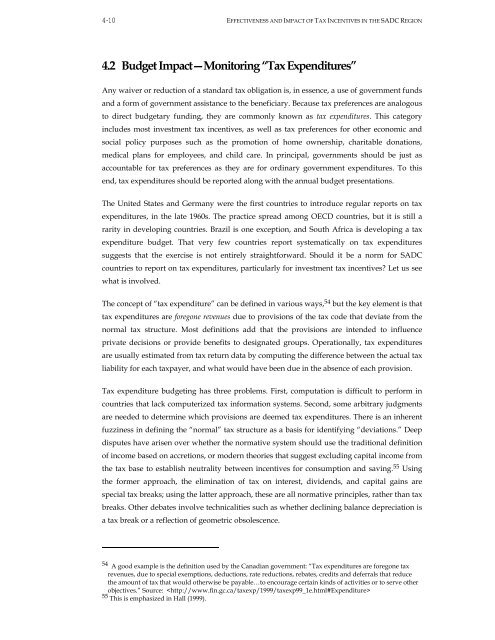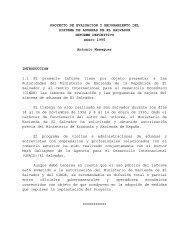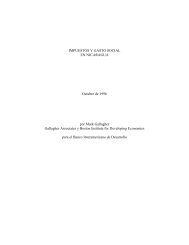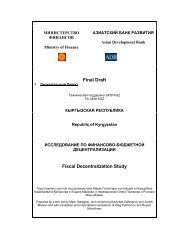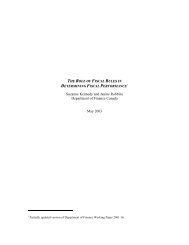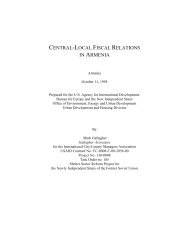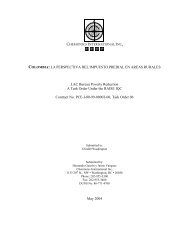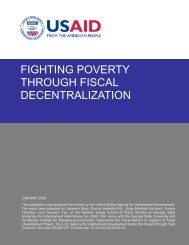Effectiveness and Economic Impact of Tax Incentives in the SADC ...
Effectiveness and Economic Impact of Tax Incentives in the SADC ...
Effectiveness and Economic Impact of Tax Incentives in the SADC ...
Create successful ePaper yourself
Turn your PDF publications into a flip-book with our unique Google optimized e-Paper software.
4-10 EFFECTIVENESS AND IMPACT OF TAX INCENTIVES IN THE <strong>SADC</strong> REGION<br />
4.2 Budget <strong>Impact</strong>—Monitor<strong>in</strong>g “<strong>Tax</strong> Expenditures”<br />
Any waiver or reduction <strong>of</strong> a st<strong>and</strong>ard tax obligation is, <strong>in</strong> essence, a use <strong>of</strong> government funds<br />
<strong>and</strong> a form <strong>of</strong> government assistance to <strong>the</strong> beneficiary. Because tax preferences are analogous<br />
to direct budgetary fund<strong>in</strong>g, <strong>the</strong>y are commonly known as tax expenditures. This category<br />
<strong>in</strong>cludes most <strong>in</strong>vestment tax <strong>in</strong>centives, as well as tax preferences for o<strong>the</strong>r economic <strong>and</strong><br />
social policy purposes such as <strong>the</strong> promotion <strong>of</strong> home ownership, charitable donations,<br />
medical plans for employees, <strong>and</strong> child care. In pr<strong>in</strong>cipal, governments should be just as<br />
accountable for tax preferences as <strong>the</strong>y are for ord<strong>in</strong>ary government expenditures. To this<br />
end, tax expenditures should be reported along with <strong>the</strong> annual budget presentations.<br />
The United States <strong>and</strong> Germany were <strong>the</strong> first countries to <strong>in</strong>troduce regular reports on tax<br />
expenditures, <strong>in</strong> <strong>the</strong> late 1960s. The practice spread among OECD countries, but it is still a<br />
rarity <strong>in</strong> develop<strong>in</strong>g countries. Brazil is one exception, <strong>and</strong> South Africa is develop<strong>in</strong>g a tax<br />
expenditure budget. That very few countries report systematically on tax expenditures<br />
suggests that <strong>the</strong> exercise is not entirely straightforward. Should it be a norm for <strong>SADC</strong><br />
countries to report on tax expenditures, particularly for <strong>in</strong>vestment tax <strong>in</strong>centives? Let us see<br />
what is <strong>in</strong>volved.<br />
The concept <strong>of</strong> “tax expenditure” can be def<strong>in</strong>ed <strong>in</strong> various ways, 54 but <strong>the</strong> key element is that<br />
tax expenditures are foregone revenues due to provisions <strong>of</strong> <strong>the</strong> tax code that deviate from <strong>the</strong><br />
normal tax structure. Most def<strong>in</strong>itions add that <strong>the</strong> provisions are <strong>in</strong>tended to <strong>in</strong>fluence<br />
private decisions or provide benefits to designated groups. Operationally, tax expenditures<br />
are usually estimated from tax return data by comput<strong>in</strong>g <strong>the</strong> difference between <strong>the</strong> actual tax<br />
liability for each taxpayer, <strong>and</strong> what would have been due <strong>in</strong> <strong>the</strong> absence <strong>of</strong> each provision.<br />
<strong>Tax</strong> expenditure budget<strong>in</strong>g has three problems. First, computation is difficult to perform <strong>in</strong><br />
countries that lack computerized tax <strong>in</strong>formation systems. Second, some arbitrary judgments<br />
are needed to determ<strong>in</strong>e which provisions are deemed tax expenditures. There is an <strong>in</strong>herent<br />
fuzz<strong>in</strong>ess <strong>in</strong> def<strong>in</strong><strong>in</strong>g <strong>the</strong> “normal” tax structure as a basis for identify<strong>in</strong>g “deviations.” Deep<br />
disputes have arisen over whe<strong>the</strong>r <strong>the</strong> normative system should use <strong>the</strong> traditional def<strong>in</strong>ition<br />
<strong>of</strong> <strong>in</strong>come based on accretions, or modern <strong>the</strong>ories that suggest exclud<strong>in</strong>g capital <strong>in</strong>come from<br />
<strong>the</strong> tax base to establish neutrality between <strong>in</strong>centives for consumption <strong>and</strong> sav<strong>in</strong>g. 55 Us<strong>in</strong>g<br />
<strong>the</strong> former approach, <strong>the</strong> elim<strong>in</strong>ation <strong>of</strong> tax on <strong>in</strong>terest, dividends, <strong>and</strong> capital ga<strong>in</strong>s are<br />
special tax breaks; us<strong>in</strong>g <strong>the</strong> latter approach, <strong>the</strong>se are all normative pr<strong>in</strong>ciples, ra<strong>the</strong>r than tax<br />
breaks. O<strong>the</strong>r debates <strong>in</strong>volve technicalities such as whe<strong>the</strong>r decl<strong>in</strong><strong>in</strong>g balance depreciation is<br />
a tax break or a reflection <strong>of</strong> geometric obsolescence.<br />
54 A good example is <strong>the</strong> def<strong>in</strong>ition used by <strong>the</strong> Canadian government: “<strong>Tax</strong> expenditures are foregone tax<br />
revenues, due to special exemptions, deductions, rate reductions, rebates, credits <strong>and</strong> deferrals that reduce<br />
<strong>the</strong> amount <strong>of</strong> tax that would o<strong>the</strong>rwise be payable…to encourage certa<strong>in</strong> k<strong>in</strong>ds <strong>of</strong> activities or to serve o<strong>the</strong>r<br />
objectives.” Source: <br />
55 This is emphasized <strong>in</strong> Hall (1999).


